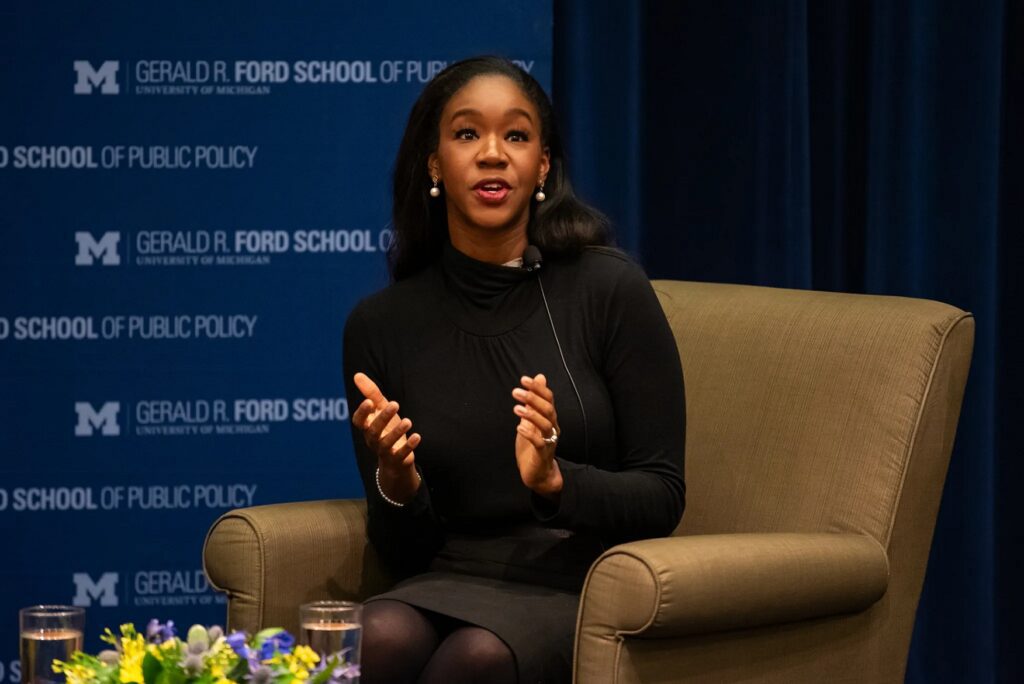Michigan Supreme Court Justice Kyra Harris Bolden talks race and justice at Ford School
By Shane Baum
On November 13, 2023

The Ford School of Public Policy hosted Michigan Supreme Court Justice Kyra Harris Bolden Monday afternoon in Weill Hall to discuss her upbringing and career in public office. Judge Laurel Beatty Blunt, Ford School Towsley Foundation Policymaker in Residence and judge on Ohio’s Tenth District Court of Appeals led the discussion with Bolden. The event was part of the Ford School’s Policy Talks lecture series, held in collaboration with the University’s Center for Racial Justice and the Harry A. and Margaret D. Towsley Foundation.
The two judges discussed how their family history impacted their legal careers. Bolden, a native of Southfield, Mich., recalled her grandmother telling her stories about her great-grandfather Jesse Lee Bond — a Tennessee cotton farmer — who was lynched in 1939 after asking for a recpiet and subsequently getting into a argument with a store owner.
“A question I usually get is why would someone be lynched for asking for a receipt?” Bolden said. “And my response is always that it wasn’t the receipt. It was the audacity.”
Bolden served in the Michigan House of Representatives from 2019 to 2023, where she represented the 35th District. After losing a Michigan Supreme Court race in 2022, she was appointed by Gov. Gretchen Whitmer to succeed Chief Justice Bridget Mary McCormack later that year after McCormack retired. Bolden’s appointment made her the first Black woman to sit on the state’s highest court. Bolden said while she is honored to be the first Black woman on the Michigan Supreme Court, she thinks there should have been a Black woman on the court much sooner.
“It kind of makes me cringe because it’s 2023 and to me it’s just unacceptable,” Bolden said.
Event attendees were given the opportunity to ask the judges questions following the discussion. Public Policy junior Maeve Larco asked if the judges’ individual family histories and identities affect their rulings or how they conduct themselves in court.
“Even though we are interpreting the law, we bring our lived experiences to the table,” Bolden said. “That might be in a way we run our chambers, that might be how we interact with individuals. It’s important for me to do these types of events … because I think it’s important for people to see me.”
Judge Beatty Blunt noted the polarization in the United States on various political issues, specifically about race. Though judges have a general obligation to remain objective and unbiased, Beatty Blunt said young people have a unique opportunity to participate in advocacy and transform their legal system into one that represents their values. “What I have seen from this generation has been amazing,” Bolden said. “The level of enthusiasm, the level of activism and the level of demanding change. It just uplifts me. I am so inspired by this next generation.”
Business senior Audrey Thedford attended the event and told The Michigan Daily she was thankful that she got to hear from two Black judges talk about their career and their perspective on the justice system.
“Having this discussion today was so inspiring for me, not only what people around me are capable of but also what I’m capable of,” Thedford said. “They said, it’s your turn and you don’t have to wait … and then just seeing Black women doing amazing things in front of me and having an opportunity to go see them, I’m just overwhelmed with emotion.”
This piece was republished from The Michigan Daily.